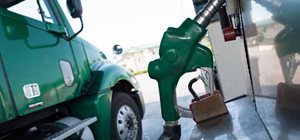 As the price of fuel continues to go up, it may feel like your fuel surcharge keeps going less and less far (even if it continues to move up with fuel prices). There will always be several factors you have minimal control over with your expenses, but fuel is one thing that you can control (to a certain degree).
As the price of fuel continues to go up, it may feel like your fuel surcharge keeps going less and less far (even if it continues to move up with fuel prices). There will always be several factors you have minimal control over with your expenses, but fuel is one thing that you can control (to a certain degree).
Here are some things that you can do to reduce your fuel costs right away:
- Check your RPMs. Many times you hear the advice to lower your speed to save fuel. However, if your truck is geared to operate at high speeds then you need to be running at those high speeds. Play around with different RPMs to determine where your sweet spot is and try to operate at in that range of RPM.
- Make sure your tires are inflated to the proper levels. Having improperly inflated tires can increase the amount of rolling resistance that you have and reduce your fuel mileage.
- Use Progressive shifting. Shift at low RPMS in order to reduce the amount of fuel used between switching gears.
- Cut idle time. If you know it’s going to be hot over your 10-hour break, it may be cheaper for you to go park at a movie theater and see a movie for 2 to 3 hours than to idle for the same amount of time (keep in mind that this reduces wear and tear on your truck as well).
Here are some additional ways you can boost fuel mileage. Some examples require an investment, but often times pay for themselves over the course of the year.
- Consider getting an APU. If you are leasing your truck make sure that the lease paperwork allows you to have an APU installed in your truck. This can save you a significant amount of money both in fuel and in maintenance.
- Consider purchasing low rolling resistance tires. The more surface area you have on the road, the more friction you have and the more fuel you burn.
- Purchase trailer skirts. Trailer skirts can help reduce your air resistance, but only if you own your own trailer should you consider this option. There are several types of wind resistance upgrades that you purchase for your truck or trailer. I recommend that you find the solutions that work best for you.
- Keep up with preventative maintenance. If your truck is not able to function properly then you will not be able to get the maximum fuel mileage.
- Consider a truck upgrade. There have been several improvements to fuel efficiency since 2012. You may incur more of a payment for lease, but you will want to weigh that against potentially lower maintenance and reduce fuel cost as well.
Small changes can make a big difference over the course of the year. There is no simple one size fits all method for boosting your fuel mileage, but with careful testing, you can find what works best for you and your truck.